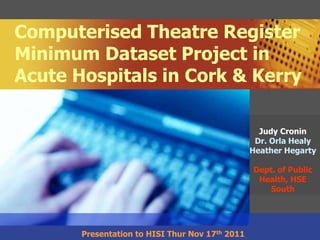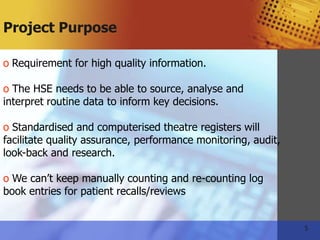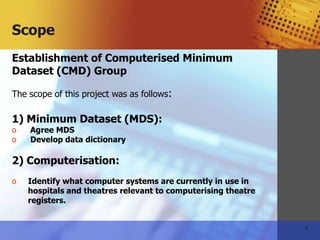Computerised Theatre Register And Minimum Dataset Presentation - Judy Cronin
- 1. Computerised Theatre Register Minimum Dataset Project in Acute Hospitals in Cork & Kerry Judy Cronin Dr. Orla Healy Heather Hegarty Dept. of Public Health, HSE South Presentation to HISI Thur Nov 17th 2011
- 2. Background ’ü¼ A review of theatre activity in 2008 in all HSE hospitals in Cork and Kerry was conducted under the Reconfiguration of Health Services. ’ü¼ Theatre logbooks or registers varied from place to place ’ü¼ All were manually entered, paper based systems ’ü¼ Computer systems existed, they did so in parallel with paper based systems ’ü¼ Similar but not standardised data 2
- 3. Key Data Management Recommendation: ŌĆ£A standardised computerised theatre logbook system developed in all hospitals.ŌĆØ HSE Performance Report February 2009 (2nd April 2009); page 32 3
- 4. Extracting data for THEATRE review, audit or service planning is extremely difficult o time consuming o labour intensive o inefficient o expensive o a major logistical challenge 4 o security concerns
- 5. Project Purpose o Requirement for high quality information. o The HSE needs to be able to source, analyse and interpret routine data to inform key decisions. o Standardised and computerised theatre registers will facilitate quality assurance, performance monitoring, audit, look-back and research. o We canŌĆÖt keep manually counting and re-counting log book entries for patient recalls/reviews 5
- 6. The advantages of an electronic logbook: ŌĆó More efficient data access ŌĆó Higher data quality ŌĆó Increased ability to conduct quality improvement and clinical research activities. 6
- 7. Scope Establishment of Computerised Minimum Dataset (CMD) Group The scope of this project was as follows: 1) Minimum Dataset (MDS): o Agree MDS o Develop data dictionary 2) Computerisation: o Identify what computer systems are currently in use in hospitals and theatres relevant to computerising theatre registers. 7
- 8. iSoft Operating Theatre Module MDS Collation Systems in use Meetings with Meetings with Meetings with across all Hospitals Nationally Theatre Managers CUH IT TPOT Group Cork & Kerry 8
- 9. MDS Theatres ŌĆō Current picture 9
- 10. Systems in use Nationally Table 1 Results of Operating Theatre Telephone Questionnaire 34 (61.8%) No Computerised Operating Theatre System Dual Paper-based AND 6 (11%) Computerised Operating Theatre System Fully electronic Operating 8 (14.5%) (2 Theatre System Hospitals very unhappy with similar system) Electronic Orthopaedic 5 (9%) Operating System only No Reply 2 (3.6%) Total 55 (100%) 10
- 11. Fact Finding Mission ŌĆō Meetings with Theatre Managers ŌĆó HSE WEST IPMS Operating Theatre presentation ŌĆó Roll-out of IPMS Theatre module in Letterkenny, Sligo & UCHG ŌĆó Senior Management and IT support critical. ŌĆó Used ICD-10 HIPE Codes ŌĆó Recommends a succession plan post implementation (add a procedure) ŌĆó On-site visit to Tallaght ŌĆó High level Governance group & excellent IT support (dedicated IPMS IT Project Co- Ordinator) ŌĆó Product Initiation Document and Cost Benefit Analysis Report. Extra data points, PCŌĆÖs ŌĆō Thin Client and washable keyboards. ŌĆó Used ICD-10 HIPE Codes ŌĆō manually inputted. ŌĆó Procedure codes associated with each Consultant ŌĆō system monitors time & adjusts time. ŌĆó Used widely for audit and has vastly improved efficiency. 11
- 12. CUH IT ŌĆō IPMS Operating Theatre Project IPMS Theatre IT Project driver in CUH ŌĆó Theatre 3 Neurosurgery ŌĆō fully implemented 24/7 ŌĆó CUMH Gynae/Obstetrics ŌĆō fully implemented 24/7 ŌĆó Theatre 1 and 1A Cardiothoracic ŌĆō one year, then stopped. ŌĆó Currently used for theatre bookings or elective list in 1, 1A, 5, 6 & 7, 8. OBSTACLES ŌĆó Key Theatre staff drivers (willing to run with this) Governance (at Mgt. level to push project forward) 12
- 13. Legal status of Log Books ŌĆ£there is no legal reason why we cannot move to a fully computerised Theatre Log BookŌĆØ In-house HSE Barrister ŌĆ£Theatre register should be kept in every theatre to record essential details of all surgical procedures. It can be either paper, book format or electronic.ŌĆØ Standards & Recommendations for Safe Peri-Operative Practice (Pg 28Afpp 2007) 1.12.2. 13
- 14. IPMS Screen Shots ŌĆō Theatre Overview CUH 14
- 15. CUH IT ŌĆō IPMS- In-Theatre Details Tab 15
- 16. Data Dictionary IPMS 16
- 17. TPOT Project ŌĆō The Productive Operating Theatre group TPOT is interested in ŌĆ” data that could or would be useful when looking at making improvements in the future. the same core data collected via IPMS is at the centre of both projects. 17
- 18. New South Wales Health Department, Operating Theatre Management Project Report Only 29 facilities were using the same definitions. The report states that ŌĆ£establishing common data definitions was essential to ensure comparability of activity data.. A revised MDS be mandated across NSW Health SystemŌĆØ New South Wales Health Department, NSW Health Operating Theatre Management 18 Project Report, NSW, 2002
- 19. Where we are at nowŌĆ”ŌĆ” CMD TPOT IPMS Combine our efforts. CUH ŌĆó Local Theatre Manager drivers identified ŌĆó Orthopaedics is now the Productive Theatre ŌĆ£Showcase TheatreŌĆØ ŌĆó Implementing IPMS Operating Theatre module Theatre by Theatre TGH ŌĆó Building their Theatre IT systems/scheduling system in Kerry from paper basis. ŌĆó Eager and ready to move to IPMS Nov 2011 Kerry General is scheduled to go-live MUH & SIVUH ŌĆó Just implemented IPMS across the Hospitals (with the intention of making the Operating Theatre Module available) 19
- 20. It is our recommendation that .. ŌĆó All Acute Hospitals computerise the theatre register ŌĆó Where available IPMS be used as the system to achieve automation ŌĆó Where other IT systems are employed, the same core MDS is collected ŌĆó TPOT review the minimum dataset and data dictionary agreed by this group with a view to national adoption. ŌĆó TPOT review the extra key data items recommended by this group and consider what other items will be required for performance monitoring in the future ŌĆó TPOT liaise with the HSE National iSoft Liaison link to negotiate a consistent coordinated approach to IT development in Theatres and minimise the costs involved 20
- 21. CMD Group Members Dr. Orla Healy ŌĆō Project Lead Reconfiguration Judy Cronin Health Informatics Manager DPH Heather Hegarty Senior Research Officer DPH Catherine Buttimer Theatre Manager MUH Donnacha Jordan Theatre Manager MUH Eilish Daly CNM2 for Theatres SIVUH Fionuala OŌĆÖGorman Perioperative Facilitator CUH Andrea Kennedy CNM1 for Theatres CUH Caitriona Hayes CNM3 for Theatres KGH Mary OŌĆÖRegan-Barsum CNM2 for Theatres BGH Margaret Angland, A/Clinical Nurse Manager 2 SMOH Ortho Lorraine OŌĆÖConnor Clinical Nurse Manager 2 for CUMH Theatres Geraldine Keohane Director Of Midwifery CUMH Sheila Spillane Nursing IT CUH 21 Mary-Rose Dennehy IT CUH




















